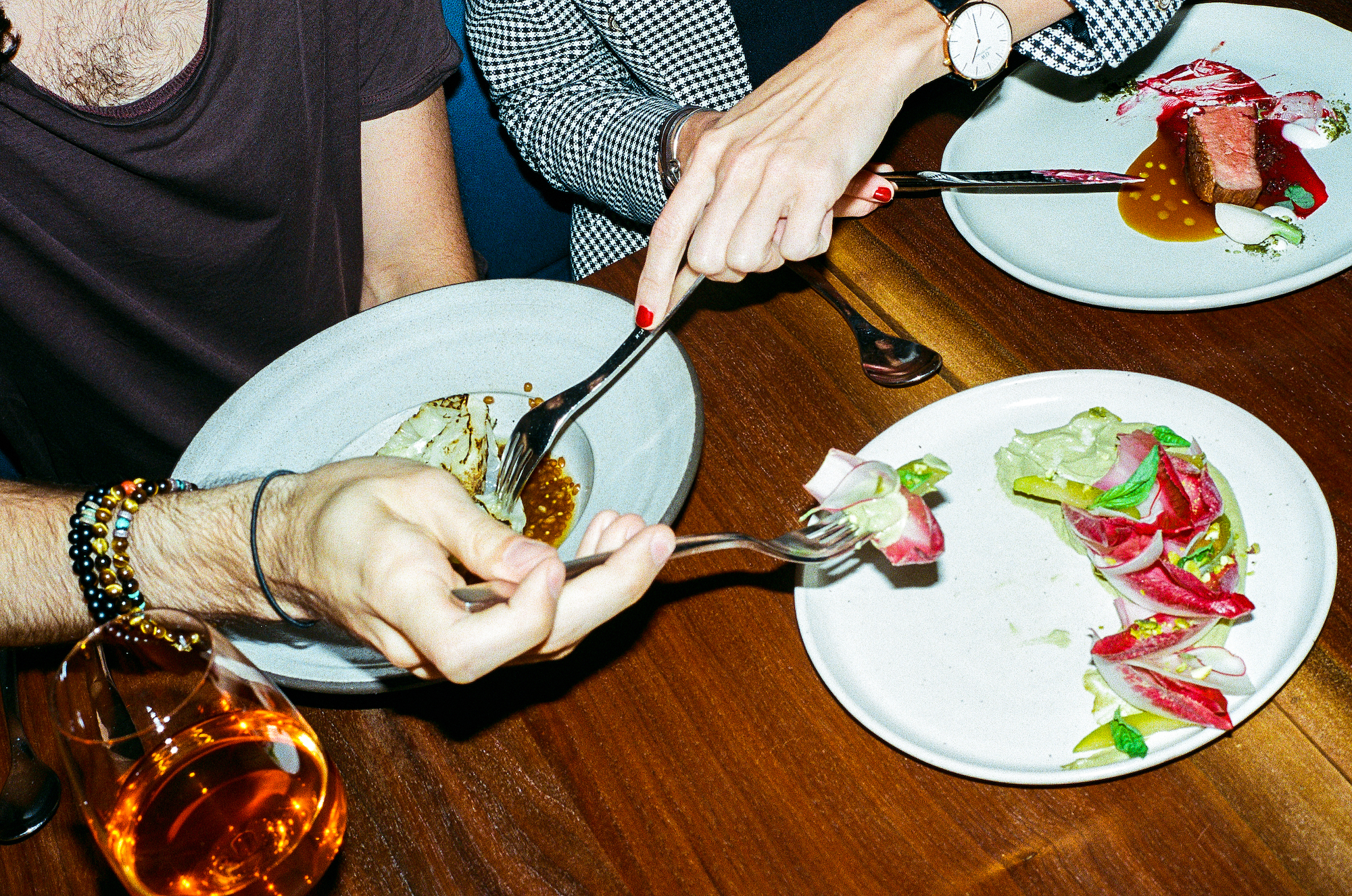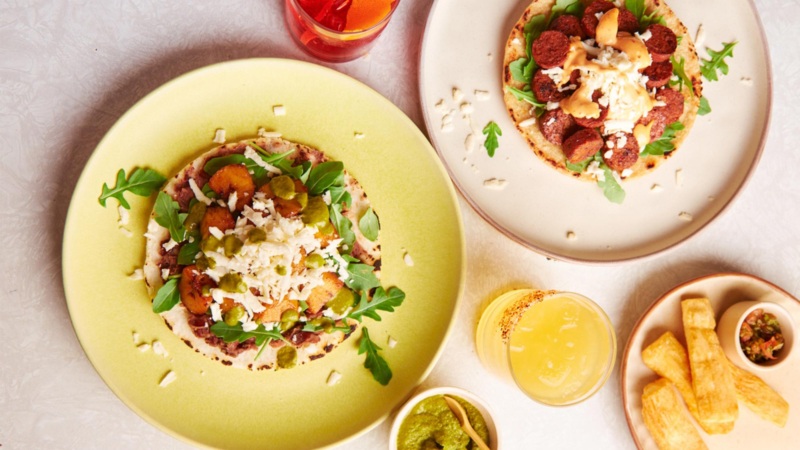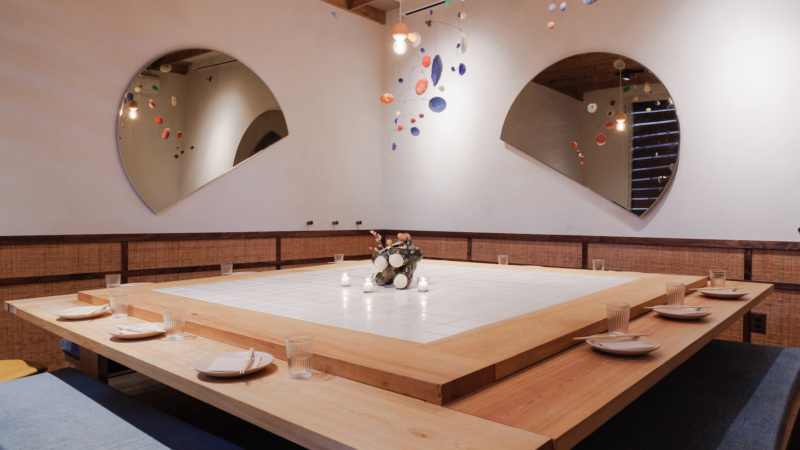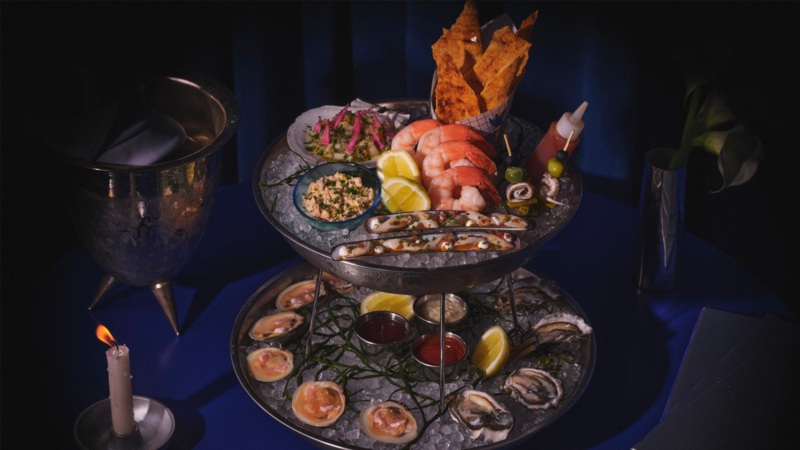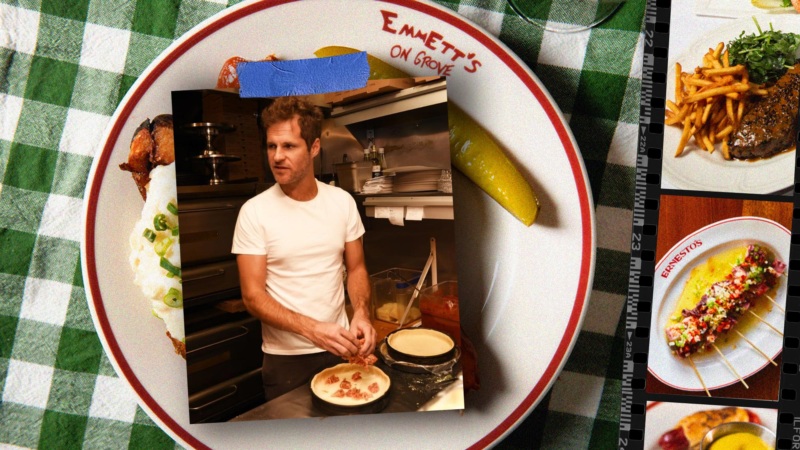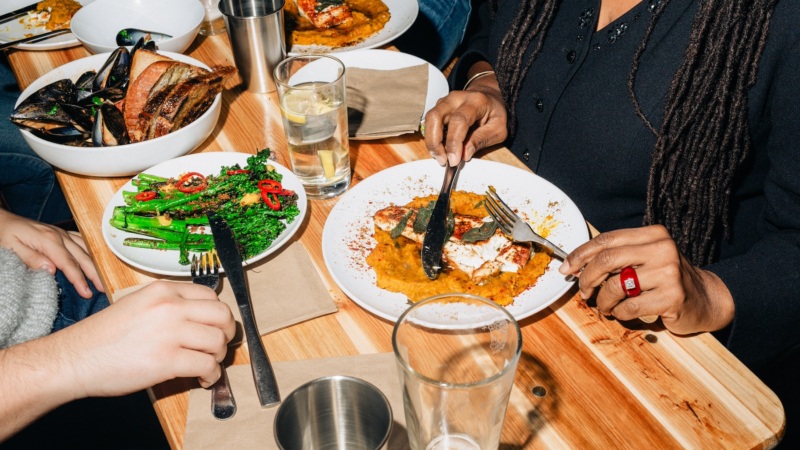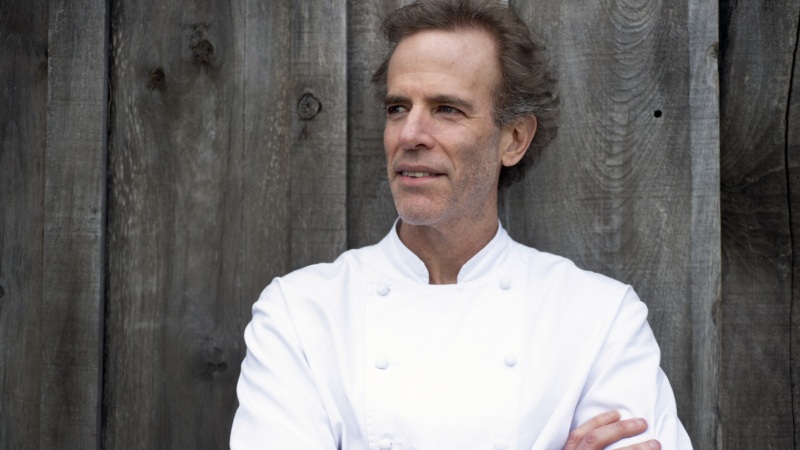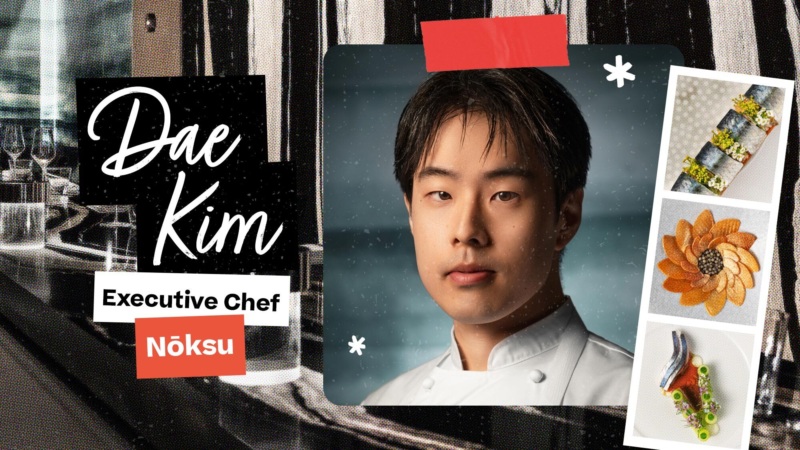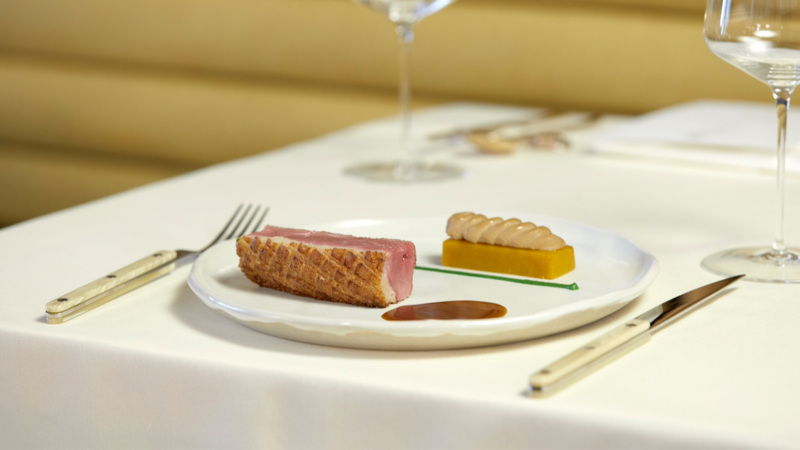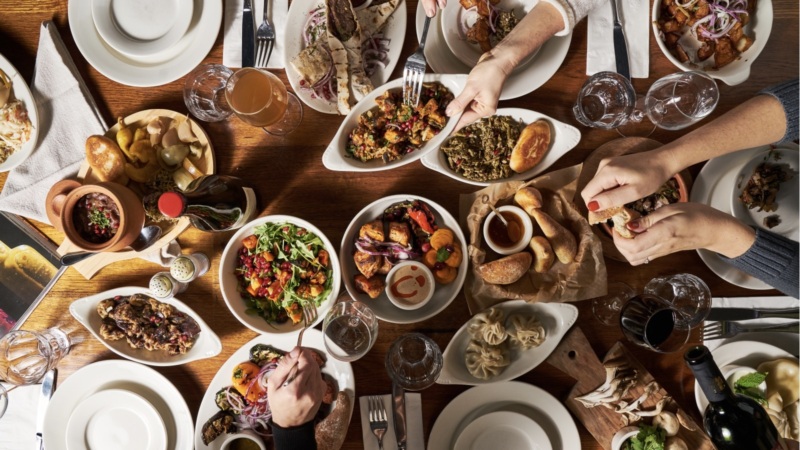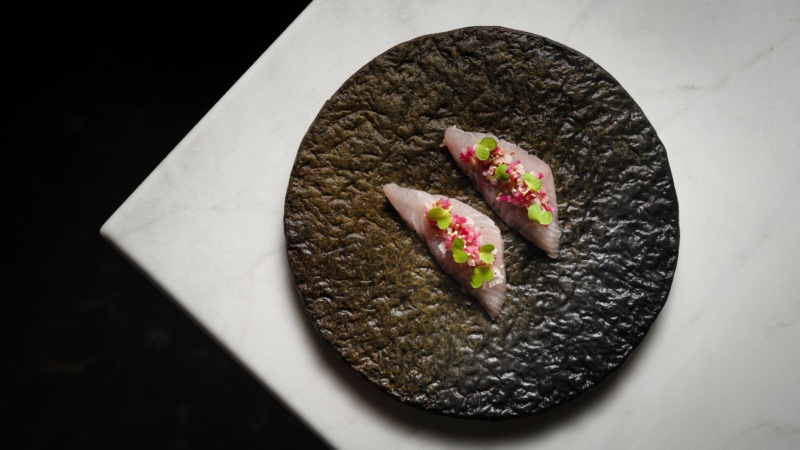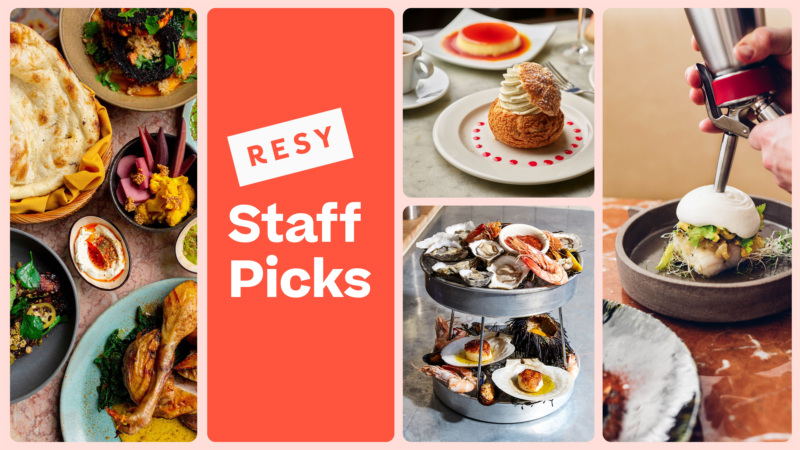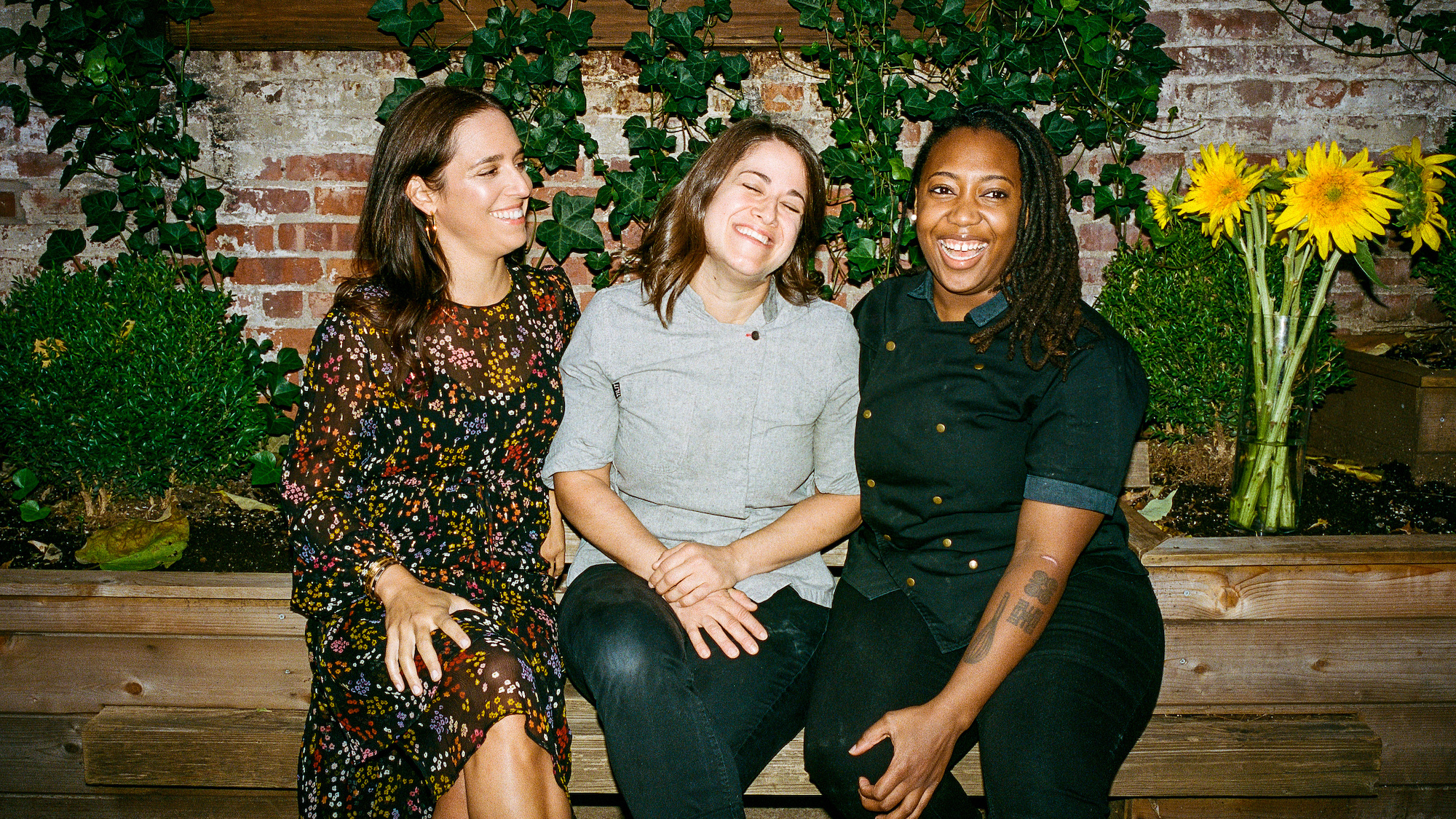
The Musket Room Won’t Go Back to the Status Quo
The white gazpacho on the menu at The Musket Room in New York is more than a good dish, it’s a point of view. Gazpacho in general is an amorphous thing; the white version loosely takes bread, some almonds, water, and seasonings and blitzes it all into a deceptively rich soup. At The Musket Room, the soup is treated with seasonal ingredients. Candy-sweet grapes are gifts from the current shoulder season linking summer to the descent of fall.
Underneath the puree are laboriously tiny cubes of cucumber, a true brunoise. The dish is technically precise, but it’s also an abstract of chef Mary Attea’s kitchen philosophy, which hovers between two states: rustic and refined, modest and ambitious. It’s a metaphor for a restaurant that is striving to bridge the proverbial gap between two opposing ideas.
Restaurants are unquestionably high-pressure environments that are full of tension — and not just the metaphorical kind. This explains, at least partially, why so many of them recently have been exposed as incubators for bad behavior. Fine-dining kitchens are especially susceptible as the quest for perfection is used to justify all sorts of behavior. After all, obsessive attention to detail is what attracts critics and diners flush with cash, and when the accolades arrive, along with a revenue bump, there’s little incentive to change — it’s a pervasive cycle of negative reinforcement. As Attea puts it, “A lot of people who aspire for greatness don’t care who they hurt along the way.”
And yet, the challenge of running a professional kitchen has never been more apparent as pandemic shortages continue to disrupt the industry, and a mental health crisis simmers among restaurant workers. The harsh nature of the job explains, in part, why the industry still hasn’t recovered from the crippling labor crisis, as people leave the industry en masse. Despite this widespread professional burnout, fine dining has roared back to life in New York. Expensive tasting menus seem to be popping up faster than chanterelles after a good rain. But while business is booming, it is still a volatile time for this segment of the industry, which is on the brink of returning to its toxic status quo.
Of course, not all of it is bad. Restaurants that balance culinary greatness with respect for their community of workers do exist, but they are few and far between. One of these exceptions is The Musket Room, which first opened as a fine-dining restaurant in 2013, but rebooted during the pandemic with a new kitchen team led by Mary Attea.
This wasn’t just another pandemic refresh, though: The newly formed team there is intentionally working against the fine-dining precedent of the damaged egomaniac chef, determined to balance the demands of an occasion-worthy restaurant with the ethics of working productively between a group of cooks that have uniformly high aspirations. And for this reason, The Musket Room might be one of the most important fine dining restaurants operating today in New York.


The Musket Room has always been positioned as a casual fine-dining experience, an ambiguous description, but one that signals a desire to be more relaxed than the high-strung, multi-starred operations elsewhere in town while still aspiring to be something special. The restaurant was initially a joint venture between Jennifer Vitagliano, chef Matt Lambert, and Barbara Lambert, the general manager and Matt’s wife. Pre-pandemic, it was known for its New Zealand-influenced cuisine, designed by Matt, who is a native New Zealander. A meal was interspersed with little gifts from the kitchen, and flatware was refreshed at each course — classic elements of fine dining. But the service was warm and confident, not stuffy, and the meal was considered a good value (a tasting of five courses cost $75 then).
In mid-2019, after a steady six years, Vitagliano became the majority partner in The Musket Room with a big decision to make — she would have to find a new head chef. (The Lamberts exited the business and would eventually move to New Zealand.) The implications of her choice were far-reaching, and not just because the chef cooks the food. Watching a succession of prominent chefs get knocked from their pedestals for toxic behavior, Vitagliano wanted a chef who could find that tricky balance of executing a top-tier tasting menu and doing it with grace. “The main goal was to find someone with a fresh culinary vision who would treat our team with respect and nurture their talent,” she says.


Around that time, Mary Attea was happily not working in a kitchen. She was taking some personal time off, and spending it with her family. “My father had just passed away so I didn’t really want to jump into a job. It put some perspective in my life,” Attea says. Getting back into a restaurant would require the right role, which for Attea, was nothing short of a culinary unicorn.
Years ago, while still at culinary school, Attea witnessed first-hand the intense pressures of a formal brigade-style restaurant. “There was one really young, small guy that was getting picked on the whole night,” she recalls. “I was like, this is awful. I hate this. If this is how you get there, I don’t want to be a part of this.” So instead, Attea chose to work at Anita Lo’s singular West Village restaurant, Annisa. “It was this really tight-knit group. It still had very high standards, but if you messed up, you knew there was room for error.” Working alongside Lo was a formative experience for Attea, and when Annisa closed in 2017, she only wanted to cook in similar environments. In the cutthroat restaurant world of New York, finding that again would be nearly impossible.
But in late 2017, Attea was introduced to Vitagliano through mutual friends. After a few months of getting to know each other, and realizing they shared the same values when it came to running a kitchen, it was clear it was a match. The opportunity was too good for Attea to pass up. As the executive chef, she would have free rein in reshaping the menu, drawing from the global pantry she learned to cook with at Annisa and her own Lebanese American heritage. She could add her own splash of flavors to the vegan tasting menu, which had recently been introduced. And, most important, she could grow and train the small team as she wanted.
It was the perfect fit, but not exactly perfect timing. Attea’s first day of work was the last week of February 2020 — just three weeks before the city shut down. Whatever plans she had were dashed as the city entered its first, devastating wave of the pandemic. The first few weeks of March were, according to Attea, a blur. She attempted to jump in and help the restaurant make a quick pivot to takeout, but ultimately, the decision was made to shut down temporarily. “It wasn’t worth all of us risking our lives,” she recalls. Instead of coming into work each day, the entire team sheltered in place, watching their livelihoods fully unravel.
▪️
“No one survived a global pandemic
just to go to work and be abused by someone.”
▪️
After a few harrowing months, the curve of COVID-19 cases in New York began to flatten, and Vitagliano and Attea returned to the restaurant. The two worked together to rewrite the menu, shifting away from a multi-course tasting to portable, but still high quality, comfort food like buttered crab rolls and herby roast chicken. Vitagliano was quick to adapt to the new rules and regulations in order to keep the business going. She transformed the restaurant’s backyard garden into outdoor seating, and eventually, encouraged Attea to start playing around with a longer tasting menu format again. But the uncertainty of it all was taxing. “It was really hard in the beginning,” Vitagliano says. “There’s been a lot of confusion and a lot of moments where it felt like sink or swim.”
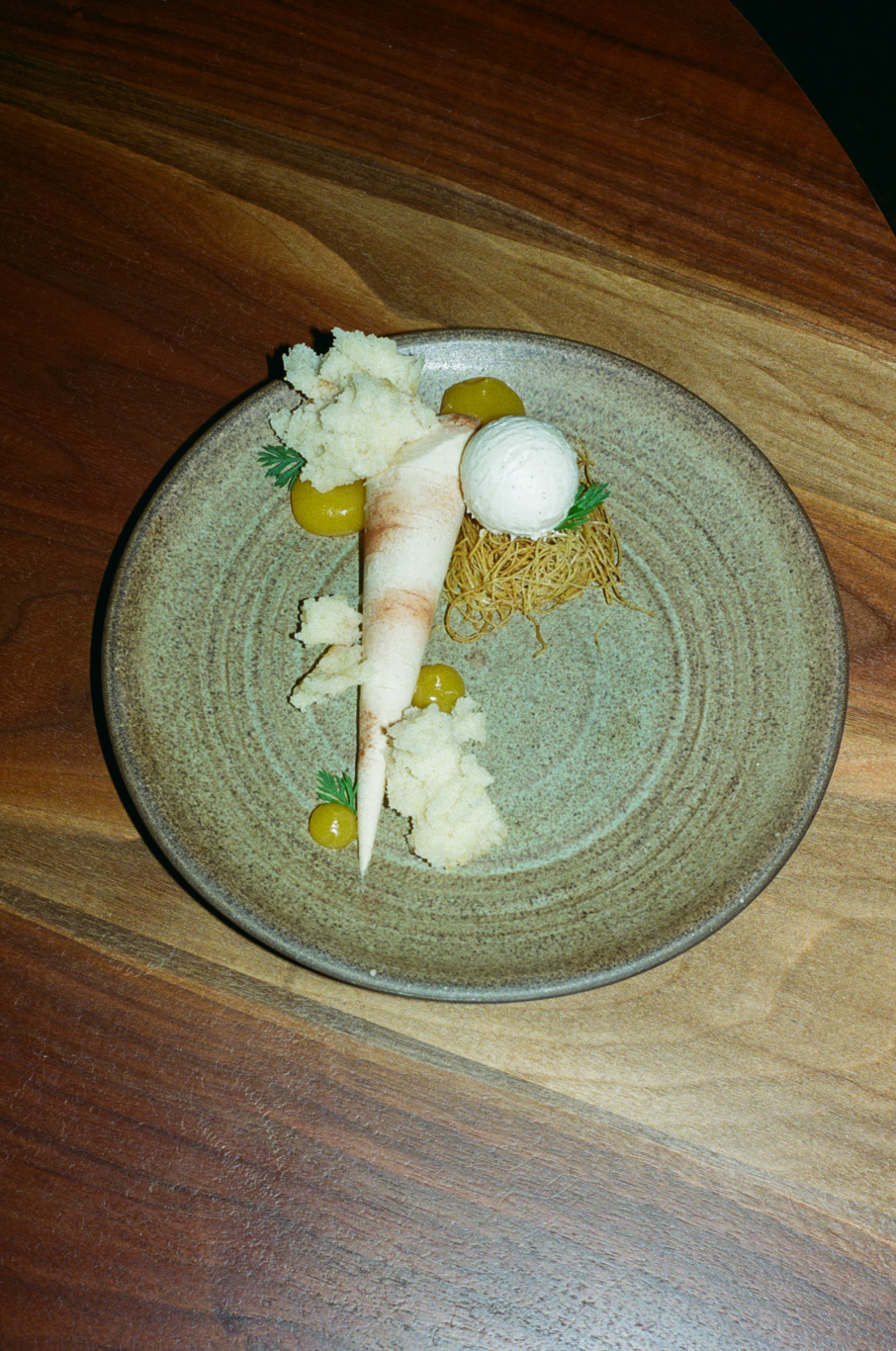
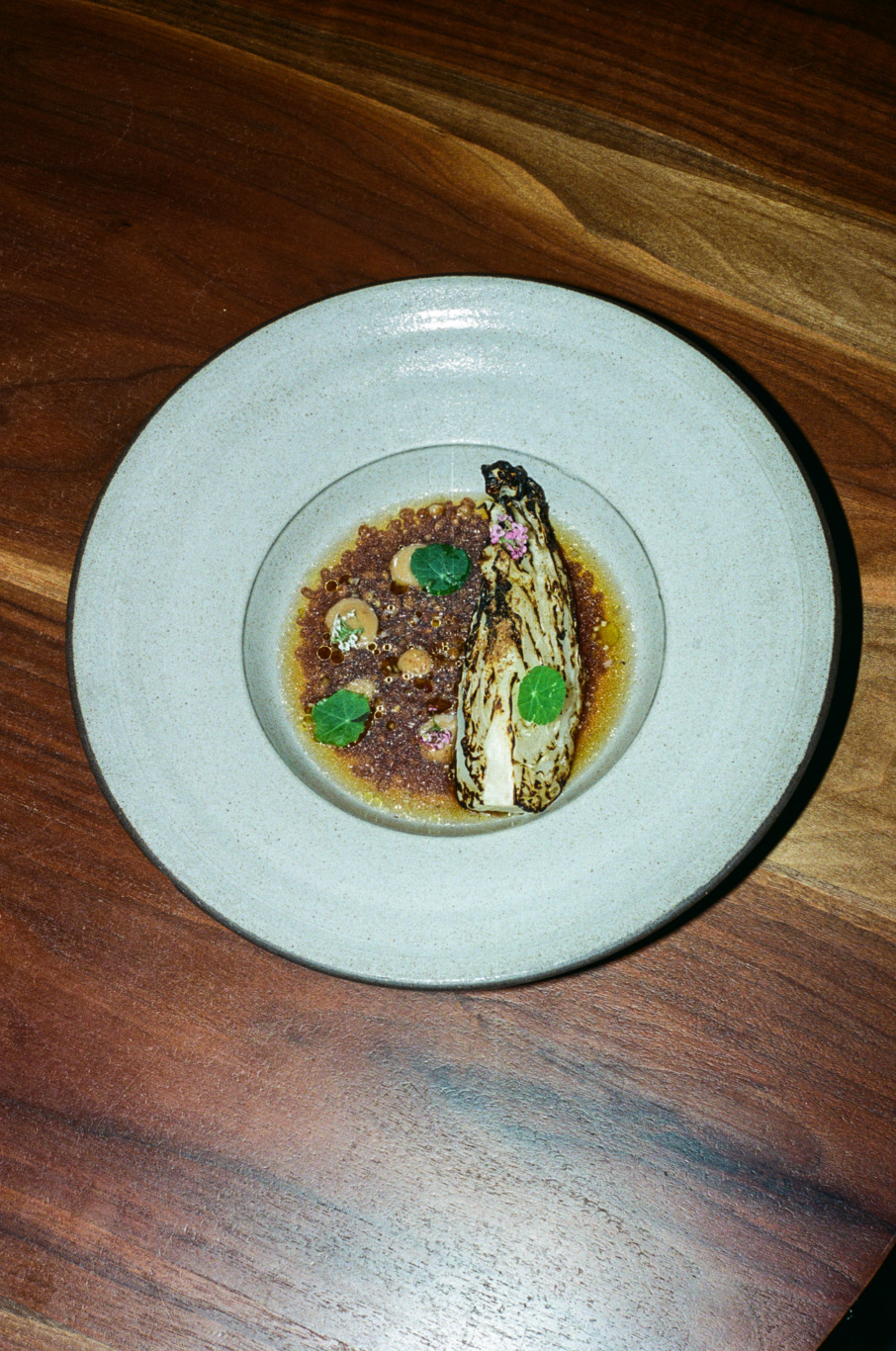
As difficult as those early days of the pandemic were for all restaurant workers who were blindly navigating social distancing restrictions and a looming sense of apprehension, the instability catalyzed an important shift in an industry. Restaurants have long needed to excise their notoriously toxic working culture, but pre-pandemic, shouts for reform fell on a mostly uninterested audience. The success of the #MeToo movement, which held harassers in the industry publicly accountable for their actions, was the closest thing to improving working conditions, but even those efforts were limited to the highest profile cases.
So last spring, amidst the clamor of 7 o’clock claps for essential workers, the most vulnerable in the industry had a platform to air their grievances. And there were quite a few. The stakes of coming in to work during a pandemic were much higher, and the rewards were fast diminishing. Restaurant workers experienced the dissonance of being essential in name while being asked to serve a largely unappreciative and, at times, disrespectful public. “No one survived a global pandemic just to go to work and be abused by someone,” said Vitagliano. “I don’t think that culture really exists anymore.” The implications for Attea as the executive chef were clear. “It’s about setting the tone from the top,” she said. “[Cooks] coming up now have an understanding that they don’t have to be abused at work. They shouldn’t be abused at work.”
▪️
The pandemic validated Vitagliano and Attea’s existing views on how to run a restaurant the right way, but it also informally marked a new culinary chapter for The Musket Room. Mid-pivot, Vitagliano made the decision to permanently supplement the restaurant’s dinner-only service with a more casual, all-day menu. It was an attempt to attract a different kind of customer, not just the special occasion guest, and it worked. “We have a whole new group of regulars, which is awesome,” Vitagliano says. Destination dining rooms across the world were retracting in similar ways, customizing menus for locals instead of an international circuit of diners. Remember when Noma was sizzling burgers instead of foraging for wild, edible flowers?
To facilitate the transition at The Musket Room, Vitagliano hired Camari Mick, a rising star pastry chef, to lead the restaurant’s first-ever dedicated pastry program. In November, around the time Mick was hired, the restaurant introduced MR All Day — weekend breakfast and lunch out of an Army green 1962 International Harvester Metro van. Mick stepped in immediately, filling the all-day menu with her pillowy donuts and biscuits stuffed with miso maple sausage and drippy eggs. Now she also collaborates with Attea on a dessert program to match the savory side of the dinner menu. Conceptually, the pair seem to be on the same page: Mick’s signature dessert is the Caramelia — named after Valrhona’s caramelized milk chocolate — which puts a stunning number of techniques on a plate, but centers around an incredibly lovable, familiar chocolate. It’s a similar refrain to Attea’s voice as a chef, balancing technique with approachability, while also taking care not to be buried beneath meaningless garnishes or distracted with overly twee presentation.
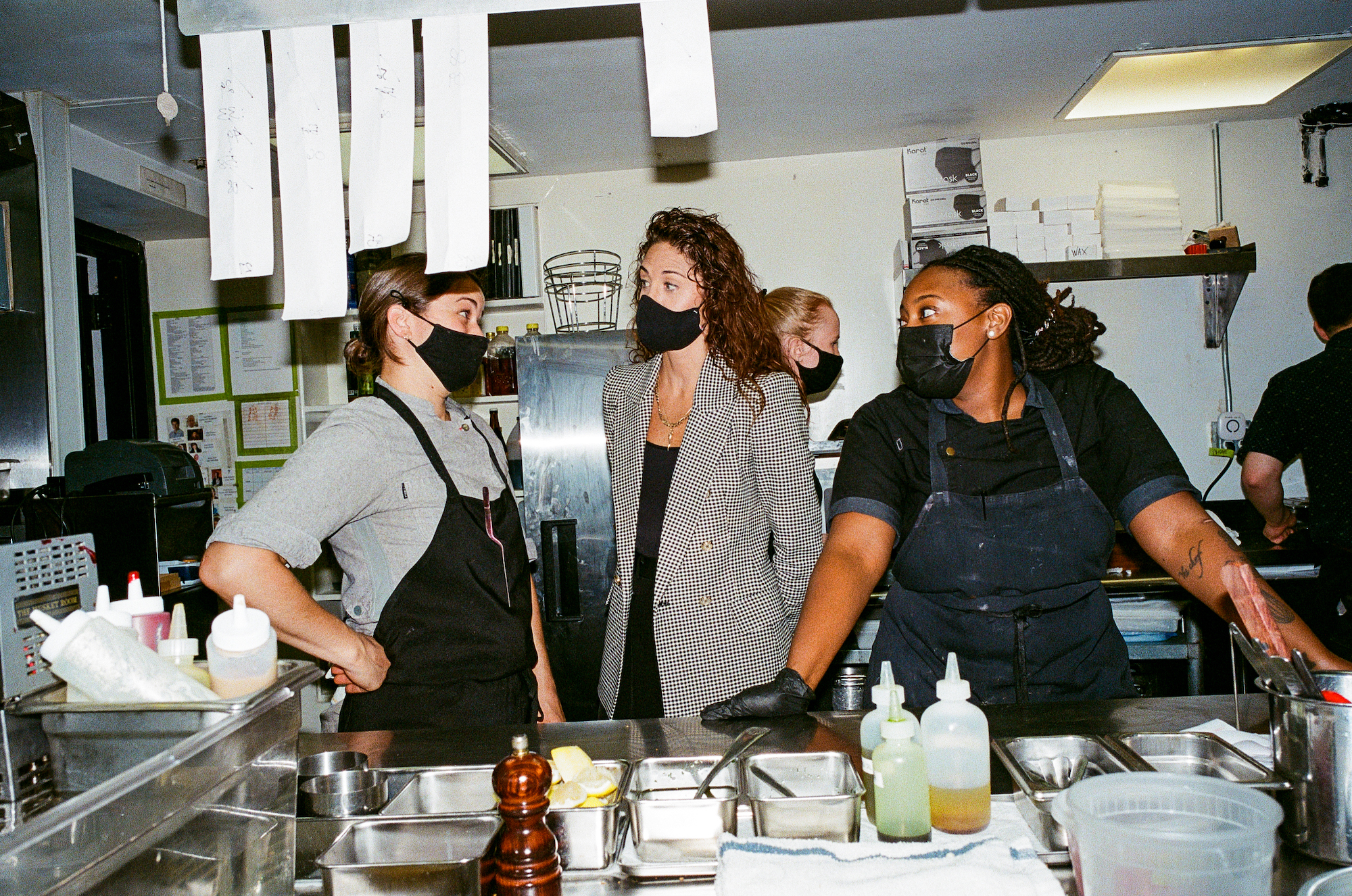
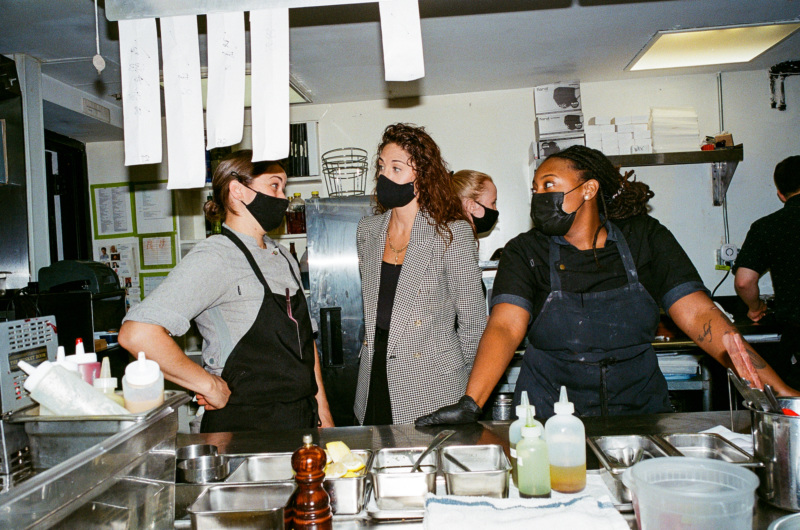
And as a part of new, industry-challenging Musket Room 2.0, Mick fits in pretty well there, too. Since graduating from culinary school in 2015, Mick has worked at some of the finest fine dining restaurants in New York, such as Le Bernardin and Per Se. Those jobs proved to be an invaluable education, putting Mick alongside some of the best in the industry, but they were also an exposure to the impossible standards of working in a top-tier restaurant. “There was always more innovation and care in the fine-dining world and I wanted to be a part of that. But nobody works in this industry because of money, so those with authority and power should make their kitchen a welcoming and learning environment, not one of unnecessary stress and conflict,” she says, implying that her experiences featured more of the latter. When I asked Mick if her priorities had changed since she set out to work in fine dining, she responded, simply, “100%.”
Mick, who participated in chef Greg Baxtrom’s Black Entrepreneur Pop-Up last year, has been vocal about the mistreatment of Black cooks in the industry. It’s something she has both seen and experienced in the industry. She attributes the hostile environments to a combination of willful ignorance and the passing down of abusive behavior. “It’s the ‘my chef did it to me, now it’s my time to do it to you’ mentality,” she said. On the flip side, those experiences resulted in some helpful perspective in her new role. “I have never felt this type of positive reinforcement before. It’s always been me trying to prove myself, and my skill, to someone.”
▪️
Despite the pressures that come with
running a fine dining restaurant …
toxicity doesn’t have to be the
only coping mechanism.
▪️
When Attea took the job at The Musket Room, she had a mandate to simply be herself and to lead by example — something she learned from her time cooking with Lo, and something she intends to pass on to her own cooks. Mick is already taking it all in. “There’s so much to learn from Mary not only about food, but leadership. I haven’t even scratched the surface yet.” The most important lesson, perhaps, is that despite the pressures that come with running a fine dining restaurant — the pandemic, the reviews, the lofty aspirations — toxicity doesn’t have to be the only coping mechanism. “At the end of the day, this is food,” says Attea. “It’s not the most important thing in the world. My team is more important than the food going out. If they’re not happy or healthy, then what’s the point?”
As fine dining forges ahead, trying to make up for a lost year while also dealing with today’s challenges, whose success will make headlines? Will it again be the restaurant with the most remarkable cuisine, accomplished behind closed doors at any cost, or the one that focuses on collaboration and work-life boundaries? Vitagliano is betting on the latter: “There are a lot of thoughtful, talented people out there. If you’re seeking work in a healthy kitchen, I think that that is going to be increasingly easier to find.” Granted, those may be a harder story to sell, as even-keeled empathy and kindness are not much of a dramatic narrative arc. But if a critical mass of restaurant owners and head chefs in the industry refuse to rely on intimidation and fear as motivation, maybe there is hope for a better, more sustainable future of fine dining. And maybe all the people who left the restaurant industry, or those reconsidering joining it, will return. Because the tension that exists on a plate doesn’t have to exist in the kitchen, too.
Mahira Rivers is a restaurant critic and writer based in New York, and Resy’s New York columnist. In addition to spending five years as an anonymous inspector for The Michelin Guides, her writing has been published in The New York Times, New York Magazine, Food & Wine, GQ and elsewhere. Follow her on Twitter and Instagram. Follow Resy, too.

